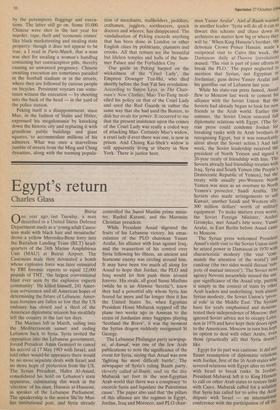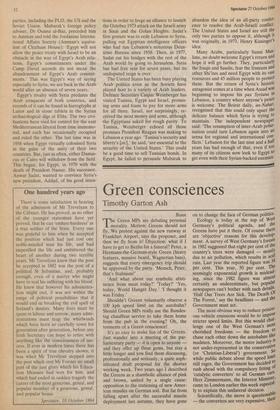Egypt's return
Charles Glass
Beirut
One year ago last Tuesday, a man described in a United States Defence Department study as a 'young adult Cauca- sian male with black hair and moustache' drove a yellow Mercedes-Benz lorry into the Battalion Landing Team (BLT) head- quarters of the 24th Marine Amphibious Unit (MAU) at Beirut Airport. The Caucasian male then detonated a bomb whose explosive force was later estimated by FBI forensic experts to equal 12,000 pounds of TNT, 'the largest conventional blast ever seen by the explosive experts community'. He killed himself, 241 Amer- ican servicemen and all American hopes of determining the future of Lebanon: Amer- ican fortunes are fallen so low that the US embassy has closed and a third of the American diplomatic mission has stealthily left the country in the last ten days.
The Marines left in March, sailing into the Mediterranean sunset and ceding Lebanon back to Syria. Syria invited the opposition into the Lebanese government, forced President Amin Gemayel to cancel his accord of 17 May 1983 with Israel, and told other would-be appeasers there would be no more separate deals with Israel and no more hope of protection from the US. The Syrian President, Hafez Al-Assad, consolidated his hold on Lebanon's state apparatus, culminating this week in the 'election' of his man, Hussein al-Husseini, as speaker of the Lebanese Parliament. The speakership is the senior Shi'ite Mus- lim institutional post, and Syria already controlled the Sunni Muslim prime minis- ter, Rashid Karami, and the Maronite Christian president.
While President Assad digested the fruits of his Lebanese victory, his emas- culation of the PLO chairman Yasser Arafat, his alliance with Iran against Iraq, and the reassertion of his control over Syria following his illness, an ancient and fearsome enemy was circling around him. It may have been too much all along for Assad to hope that Jordan, the PLO and Iraq would let him push them around forever. His rivals, all good Sunni Muslims (while he is an Alawite 'heretic'), knew they had a potential ally whom Syria has feared far more and far longer than it has the United States. So, when Egyptian President Hosni Mubarak stepped off the plane two weeks ago in Amman to the strain of Jordanian army bagpipes playing `Scotland the Brave', it was the moment the Syrian dragon suddenly recognised St George.
The Lebanese Phalangist party newspap- er, al-Aamal, was one of the few Arab publications to note the significance of the event for Syria, saying that Assad was now 'fighting his most difficult battle'. The newspaper of Syria's ruling Baath party, cleverly called al-Baath, said on the day Mubarak set foot in the non-Egyptian Arab world that there was a conspiracy `to encircle Syria and liquidate the Palestinian cause'. The paper also said that 'the pillars of this alliance are the regimes in Egypt, Jordan, Iraq and Morocco, and PLO chair- man Yasser Arafat'. And al-Baath warned in another leader: 'Syria will do all it can to thwart this scheme and chase down its architects no matter how big or where they will be.' When King Hussein's brother, the debonair Crown Prince Hassan, made a reciprocal visit to Cairo this week, the Damascus daily al-Thawra (revolution)
mused: 'The visit is part of joint efforts to break the PLO.' The paper neglected to mention that Syrian, not Egyptian or Jordanian, guns drove Yasser Arafat and his guerillas out of Lebanon last year. While his state-run press fumed, Assad flew to Moscow last week to cement his alliance with the Soviet Union. But the Soviets had already begun to look for new friends in the Arab world. Earlier this summer, the Soviet Union restored full diplomatic relations with Egypt. (The Sy- rian press could condemn Jordan for breaking ranks with its Arab brothers In recognising Egypt, but it was remarkably silent about the Soviet action.) And last week, the Soviet leadership received the president of North Yemen and signed a 20-year treaty of friendship with him. The Soviets already had friendship treaties with Iraq, Syria and South Yemen (the People's Democratic Republic of Yemen), but the treaty with usually pro-Western North Yemen was seen as an overture to North Yemen's protector, Saudi Arabia. The Soviets also made arrangements to sell Kuwait, another Saudi and Western ally, 300 million dollars' worth of military equipment. To make matters even worse: the Soviet Foreign Minister, Andre' Gromyko, met Assad's bete noire, Yasser Arafat, in East Berlin before Assad carne to Moscow.
The Syrian press welcomed President Assad's sixth visit to the Soviet Union since he seized power in Damascus in 1970 with characteristic modesty (the visit 'com- mands the attention of the world') and candour (the two sides would discuss 'sub' jects of mutual interest'). The Soviet news agency Novosti meanwhile missed the unt que significance of the Assad trip, putting it simply in the context of visits by other Arab leaders and underlining, with almost Syrian modesty, the Soviet Union's 'pivot- al role' in the Middle East. The Syrians have for yeats emphasised and demons" traced their independence of Moscow: they ignored Soviet advice not to occupy Leba- non in 1976 and have kept their doors open to the Americans. Moscow in turn has kept its option to deal with other Arabs, even those (practically all) that Syria doesn't like.
Egypt for its part was cautious. It did not flaunt resumption of diplomatic relations with Jordan, first of the 16 Arab states who severed relations with Egypt after its treaty with Israel to break ranks. In Jordan President Mubarak left it to King Hussein to call on other Arab states to restore links with Cairo. Mubarak called for a solution that Syria has called for to solve the Arab, dispute with Israel — an international conference with the participation of all the
parties, including the PLO, the US and the Soviet Union. Mubarak's foreign policy adviser, Dr Osama al-Baz, preceded him to Amman and told the Jordanian Interna- tional Affairs Society (Amman's equiva- lent of Chatham House): 'Egypt will not allow the peace treaty with Israel to be an obstacle in the way of Egypt's Arab rela- tions. Egypt's commitments under the Camp David accords do not mean the abandonment of Egypt's Arab commit- ments.' This was Egypt's way of saying especially to Syria, we are back in the Arab world after an absence of seven years.
Egypt's rivalry with Syria predates the Arab conquests of both countries, and records of it can be found in hieroglyphs at Luxor and in stone tablets in the Syrian archaeological digs at Ebla. The two civi- lisations have vied for control for the east Mediterranean littoral from time immemo- rial, and each has occasionally occupied and ruled the other. The last time was in 1958 when Egypt virtually colonised Syria in the guise of the unity of their two countries. But, just as often, either Damas- cus or Cairo will withdraw from the field. This began, for Egypt, in 1970 with the death of President Nasser. His successor, Anwar Sadat, wanted to convince Syria's new president, Addad, of his good inten tions in order to forge an alliance to launch the October 1973 attack on the Israeli army in Sinai and the Golan Heights. Sadat's first gesture was to cede Lebanon to Syria, pulling out Egyptian intelligence officers who had run Lebanon's notorious Deux- ieme Bureau since 1958. Then, in 1977, Sadat cut his bridges with the rest of the Arab world by going to Jerusalem. Syria has had free rein for seven years, but its undisputed reign is over.
The United States has been busy playing Arab politics even as the Soviets have played host to a variety of Arab leaders. Defence Secretary Caspar Weinberger has visited Tunisia, Egypt and Israel, promis- ing arms and loans to pay for more arms for all three. Israel, not surprisingly, re- ceived the most money and arms, although the Egyptians asked for rough parity. To Tunisia, Weinberger echoed all those promises President Reagan was making to Lebanon a year ago. 'Tunisia's security and liberty's [sic],' he said, 'are essential to the security of the United States.' This could be a good time to sell Tunisian bonds. In Egypt, he failed to persuade Mubarak to abandon the idea of an all-party confer- ence to resolve the Arab-Israeli conflict. The United States and Israel are still the only two parties to oppose it, although it was originally, in 1973, Henry Kissinger 's idea.
Many Arabs, particularly Sunni Mus- lims, no doubt welcome Egypt's return and hope it will go further. They, particularly the Iraqis and Saudis, fear the Iranians and other Shi'ites and need Egypt with its vast resources and 45 million people to protect them. But the return of Syria's historic antagonist comes at a time when Assad was beginning to impose his pax Syriana in Lebanon, a country where anyone's peace is welcome. The Beirut daily, an-Nahar, recognised that this could only upset the delicate balance which Syria is trying to maintain. The independent newspaper said: 'The resumption of inter-Arab polar- isation could turn Lebanon again into an arena for regional and international con- flicts.' Lebanon for the last nine and a half years has had enough of that, even if too many of its citizens now look to Egypt to get even with their Syrian-backed enemies.



















































 Previous page
Previous page